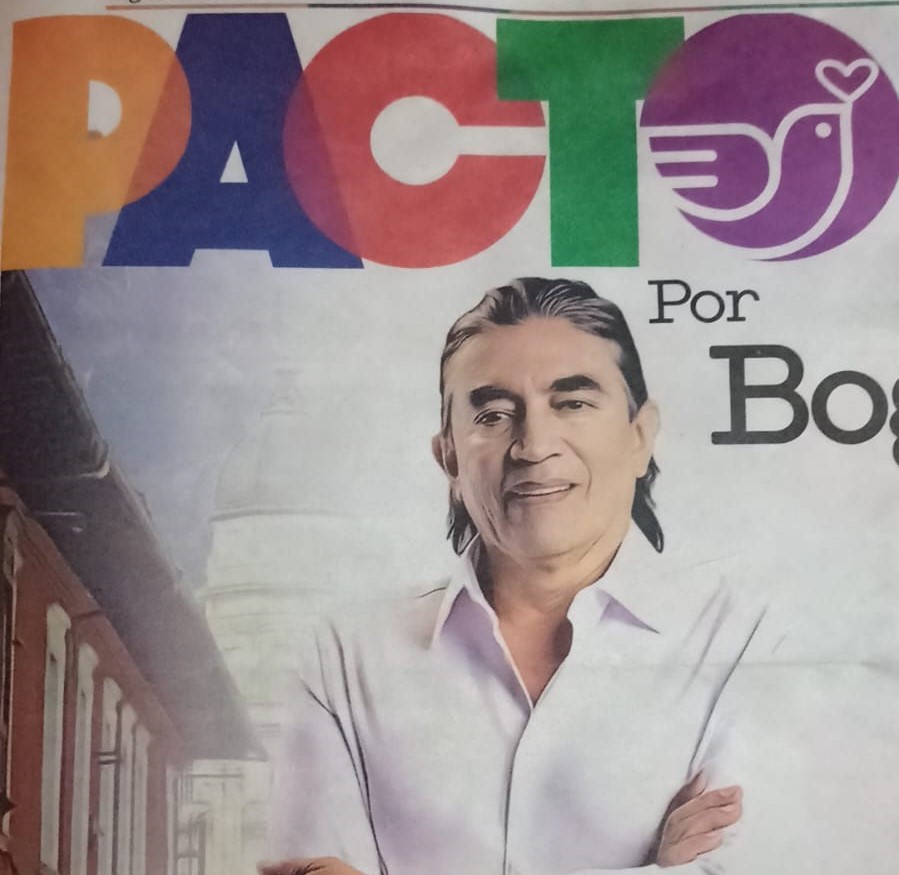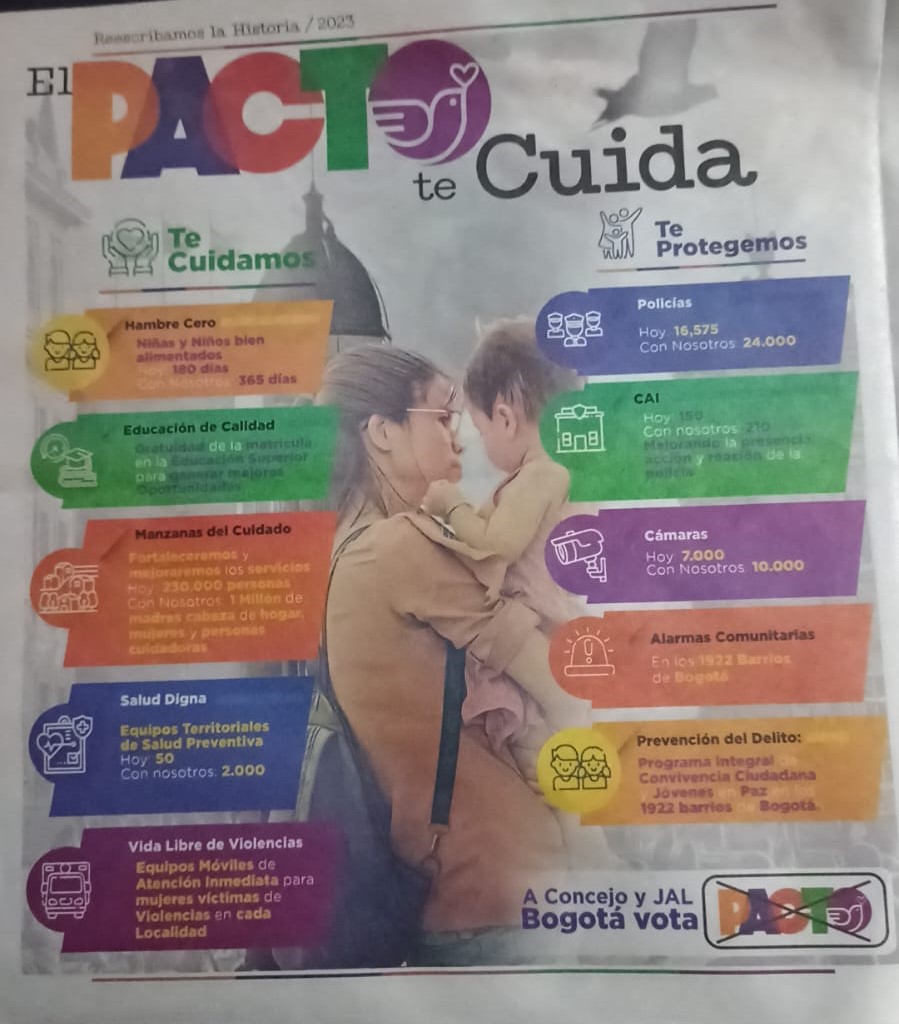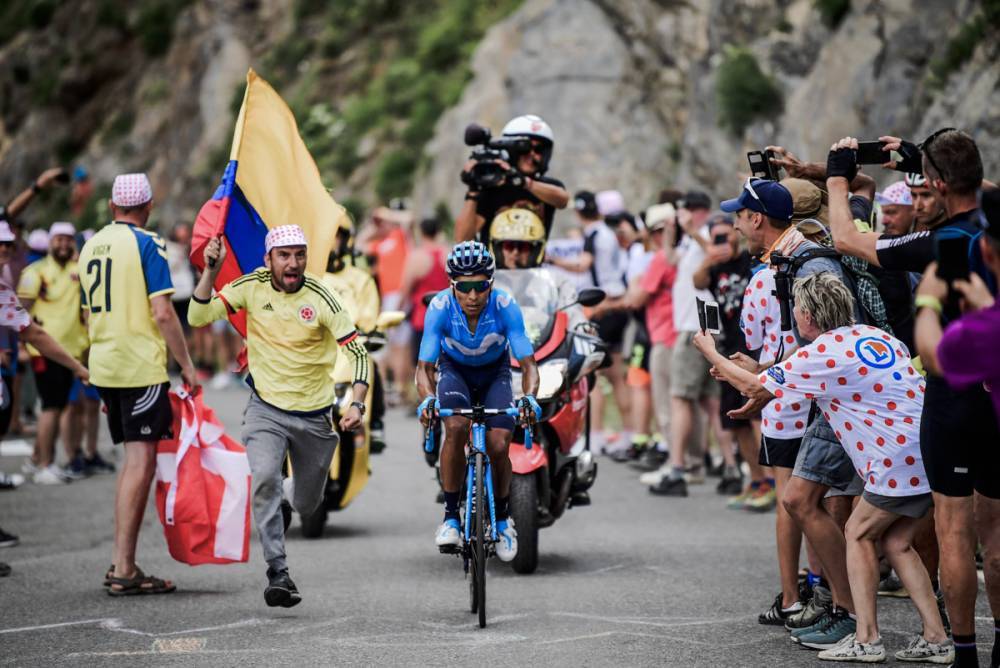Who’s this then?
The other Gustavo of leftwing politics in Colombia, Gustavo Bolívar is a former television producer and prodigious writer. He is the undoubted voice of the left in this run, representing the Pacto Hístorico coalition that currently holds the presidency. He stepped down from his position as Senator of the Republic to run in the Bogotá elections for mayor.

He has been involved in politics since the early nineties and won election to the Senate in 2018 and 2022 with high vote shares. His first love, though, is storytelling, usually connected to narcotráfico, the conflicto interno and social issues. Sin tetas no hay paraíso was his huge hit that made him a household name, before returning to representative politics.
Stonkingly rich, with beachfront houses in Miami and a property empire spanning Cundinamarca, he famously donated his salary when in Congress. He wasn’t born in the capital, but did grow up in the south of the city. He’s a working class lad looking to give something back, or at least that’s his narrative.
We contacted all the candidates we’re profiling with a questionnaire asking the same questions. We received no direct reply from Bolívar although a press contact said they would be in touch. That didn’t happen, so there are no direct quotes here.
Is he polling well?
Yes. He’s second in most of the polls, which will take him to a run-off. He’s probably the most solid of all the candidates in this regard, regularly polling at around 20% in the first round with little variation. In recent weeks, though, Juan Daniel Oviedo has gained momentum and made this a contest for second place, so it’s far from guaranteed.
However, the second round is significantly less clear. Partly it depends on who gets through. Galán will double his vote, Oviedo would be closer and Lara is hardly asked as he’s crashing in the polling. This means an uphill battle ahead.
What’s his manifesto like?
Clearly leftwing and following the central government, read it all online. It’s a real work of art, especially if you like purple. He actually has a whole nine-page section on how it will fit in with the national plan.
Much of it is simply word soup, like the other Gustavo’s plan was last year, with vaguely positive and academic-sounding adjectives like ‘intersectional’ chucked about willy-nilly. Plenty of paragraphs clock in at 20+ lines. There’s lots of generalised “promoting” and not so much clear pledges.
First off, he recognises that there are concerns over crime and proposes moving away from “blood, fire and xenophobia” to combat it. The man who is accused of burning CAIs actually proposes building more: from 150 to 210. He also wants more bobbies on the beat, increasing by 50% to 24,000. That would place the city at around 300 police per 100,000 people.
It’s not just human resources, either, he’s also promising increased surveillance, with another 3,000 cameras to watch the streets and community alarms (us neither) in every single barrio (there are nearly 2,000!) of Bogotá. A couple of planes, too, to reach the remote parts of the city. That goes along with “community justice,” which sounds worrying, as does his focus on avoiding sending anyone to jail.
He’s going hard on education, too, especially focusing on bilingualism (only in English). In the first year, this will cover pre-escolar, in ‘26 and ‘27 to primary kids. That’s right, all teachers will need to learn English well enough to teach it in three years. He also wants teachers to do courses and Masters’, and kids to stay in school all day, not split.

He’ll stick with Claudia’s focus on getting youths into uni by providing free enrolment in further education and expanding the Universidad Distrital to another four branches, focused on areas without easy access to university.
Transport is going to be green, and largely continuing con existing plans. Corredor Verde may change, but he wants a monorail (monorail, monorail) or tram on the séptima and Boyacá. He will push ahead with Regiotram and airport expansion, but wants the Metro underground on the Caracas parts.
Social issues are prevalent too, with massive increases all round. Preventative medical care to jump from 50 teams to 2,000 and children to be given year-round alimentary assistance. He wants to foster community links for dog-walking, school runs and community cookpots. He explicitly wants these to be socialised.
Cultural issues see a permanent new home for the Philarmonic, which is already happening via the Campín renovation. He wants more murals on the walls, and an army of sculptors and graffiteros to make the city into an open-air gallery. He also wants more national and international sporting events to be held in Bogotá.
Gender-specific measures will see every localidad receive a mobile anti-domestic violence unit. There’s going to be a quadrupling of service provision to cover a million women who are heads of families and carers. There will be temporary dole for women in estratos 1-4, up to three months at up to minimum wage. Boys will be taught about responsible masculinity.
Of course, all these plans are exceptionally ambitious and it’s not entirely clear if (or how) they can be financed. The manifesto itself is vague in the main, with concrete numbers usually coming from his tweets and/or pamphlets.
He acknowledges this, referencing the city’s deficit and saying that we all need to “be creative” in public spending.
What’s he been saying on the campaign trail?
His big campaign involved billboards saying, in English, that he will educate your children. Given he’s seen by some as the commie candidate, fair play for leaning fully into the Stalinist image. Notably, despite the importance he places on it, he refused to answer our questions in English (or any language), perhaps not practising what he preaches.
Those adverts were followed by an ill-advised series of jokes where he accused Carlos Galán of playing off his assassinated father’s name and Oviedo of being in love with Uribe. Unsurprisingly, neither saw the funny side, with the latter noting the homophobic undertones of the joke.
He’s also refused to attend debates where minor candidate Diego Molano is present, accusing him of insulting the Primera Línea. Bolívar sees the group as heroic defenders of their rights; Molano calls them dangerous vandals. He defended Semana when it was briefly occupied by indigenous protesters last week, but later called for the public to “take social control over media” when they step out of line.
Any skellingtons in the closet?
He has a lot to say about corruption, accusing the Senate of being mostly a bunch of grifters after stepping down and firing off attacks on all and sundry. However, he’s much more reluctant to criticise those close to him for similar things, even going so far as to justify it. Associates of his were implicated in the Nicolás Petro affair, though not him directly. His campaign seems transparent, undergoing medical tests to qualify for loans to fund himself.
His comments last year over the use of ‘unproductive land’ sounded to many like a justification of expropriation. He also strongly defends the primera línea protestors, going so far as to raise money for them through a fund called Manos Limpias. He also called for the paro nacional in 2021 to be indefinite. These are highly polarising viewpoints for most Colombians.
Perhaps the most unfair criticism was over his attendance at Petro’s rally last week. He specifically asked his followers not to bring publicity or campaign for him at that event, and stuck to it. However, the presence of a couple of supporters with placards sent right-wing Twitter into quite the tizzy.
Can he work with the central government?
If anything, he might be too close to the incumbent president Gustavo Petro. They’ve been solid allies for years and Bolívar is quick to praise and support any and all proposals or statements from the premier. Given that the OG leftist Gus is, to understate it, incredibly polarising, this will lose votes as well as gain them and open him to criticism.
There is no doubt that Gus B would have little to no resistance in any projects he proposes, and is also unlikely to oppose meddling from the central government. The former is probably a good thing, the latter less so. For example, Petro wants his underground metro and Bolívar will roll over and let it happen, although it won’t be delayed or have funding withdrawn.
Can he win?
Yes, but it won’t be easy. His incredibly loyal base will likely take him to the second round, which is potentially a much more open contest. Like his close ally Petro, he won’t get many votes from neutral voters. His best bet is to be up against Lara or Molano in the run-off, but that needs a very unlikely set of circumstances.
Bogotá is a left-leaning city and voted for Petro a year ago, so his ideas remain popular. However, the city also tends to go against the country in elections, which is an obstacle. With the central government openly floundering, that effect is doubled. Still, good organisation could produce a shock and there’s no vote-splitters to attract lefties.





